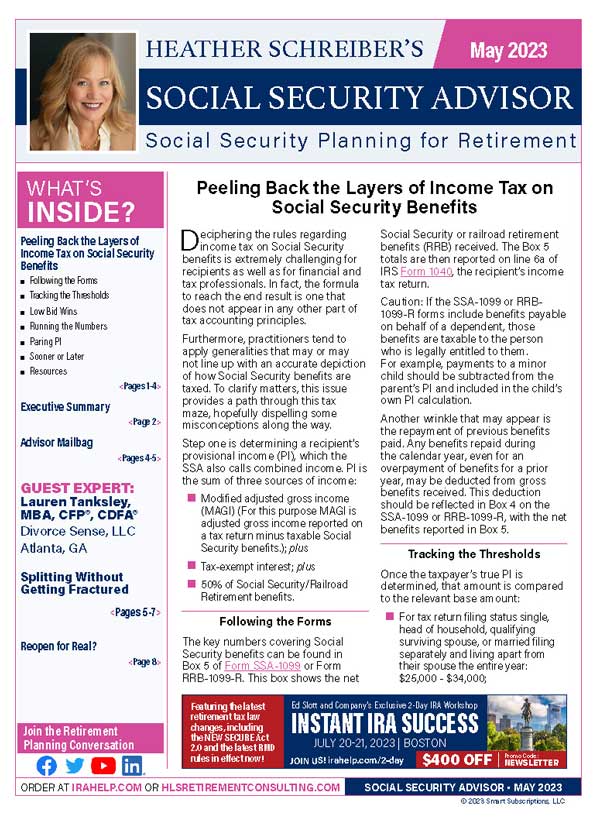Why Women May Welcome Advice from Financial Pros
The end of April brought dire news from Money magazine: Americans’ confidence that they’ll have a comfortable retirement is “plunging,” the headline announced. In the past year, the percentage of workers expecting their savings to last after they stop working fell from 73% to 64%, according to a new study from the Employee Benefit Research Institute and Greenwald Research. That’s the steepest decline since the “Great Recession” of December 2007-June 2009, with the current unease triggered by the highest inflation in 40 years.
As is often the case, those dreary data can be offset by other numbers in what might be considered the retirement confidence game. Just a month earlier—the end of March—LIMRA (formally the Life Insurance Marketing and Research Association) announced its own new study: 40% of women who work with a financial professional report feel very prepared for retirement, compared with just 27% of women who don’t work with such a pro. (LIMRA doesn’t spell out who is included as a financial professional but the term generally refers to stockbrokers, insurance agents, tax preparers, investment managers, and financial planners.)
Does merely working with an advisor spur such confidence for women? The LIMRA study indicates that fulfilling specific tasks that are recommended by financial pros bolsters the respondents’ belief that their money will last as long as they do. These are the key retirement planning activities:
- Determine the amount of financial assets that will be available for retirement spending. This was done by 53% of women working with a financial pro vs. 44% of other women.
- Project retirement expenses. The gap here was narrower: 48% to 44%, in favor of those working with financial pros.
- Estimate how many years investments will last in retirement and develop a plan for turning retirement savings into income. These two tasks revealed the largest gaps between women who relied upon financial pros and those who didn’t. The estimated duration forecast was done by 50% of women using financial pros vs. 36% of the women who didn’t use them; planning to squeeze income from financial assets also saw the professionals’ clients way ahead, 37% to 22%.
In addition, LIMRA revealed that 25% of women working with a financial pro had a formal written retirement plan, a document held by 10% of others. Creating such a plan may help to build confidence about the chances for a sound financial future.
Meanwhile, LIMRA also found that women without a financial professional were more active in some areas. Compared with women getting financial guidance from a professional, the do-it-yourselfers were more likely to have checked out what their future Social Security benefits would be at different retirement ages (54% to 50%) and to have investigated health insurance in retirement, including Medicare (46% to 41%).
Perhaps greater anxiety about retirement is generating more focus on doing the research that otherwise might be handled by a financial professional?
Going For Guarantees
As mentioned, LIMRA has its roots in the life insurance industry. Life insurers also may sell annuities. Consequently, it shouldn’t be surprising that LIMRA’s research covered women’s views on annuities that offer guaranteed lifetime income.
Overall, women’s interest in such lifelong cash flow grew by 63% from 2018 to 2022. Recent inflation and economic uncertainty were cited as causes for the growing popularity of annuities with guarantees; last year’s weakness in the stock and bond markets likely played a role as well.
Women working with a financial professional were more likely to consider converting some investment assets into a lifetime-guaranteed annuity in retirement than women without a financial pro, 52% to 44%. Left unsaid, it’s certainly true that women working with a financial professional would have a greater chance of hearing about the potential benefits of annuities than those without such assistance.
Connecting The Contradictions
If Money magazine is reporting that 64% of Americans feel confident of a comfortable retirement, how can LIMRA report that only 40% of women working with a financial professional (27% of women without such a pro) believe they’re very prepared for retirement? Are men that much more optimistic than women about enjoying retirement?
There might be a gender-based difference in outlooks but not to the degree indicated by the two surveys. Instead, the devilish details reveal the answer. The study mentioned by Money magazine, from EBRI and Greenwald Research, requested degrees of confidence; the 64% number refers to “very or somewhat [italics added] confident” responses. Only 18% of those polled answered that they are very confident.
The key takeaway here is to be skeptical of Internet or other media articles on survey results. Even minor variations in the questions asked can deliver “very” different results.
Note to Advisors: Regardless of how the questions were worded, the message of the LIMRA study is valid. Urging clients—men as well as women—to come up with hard numbers on retirement assets and post-career outlays will increase their confidence level in the retirement income planning that emerges. And those plans might include annuities with desirable guarantees.
- Understanding Medicare’s Initial Enrollment Period - August 2, 2024
- Social Security Cost-of-Living Adjustment for 2024: The Numbers Are In! - November 13, 2023
- The Importance of the Medicare Open Enrollment Period - November 3, 2023





